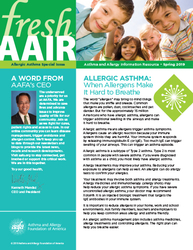First comes the tree pollen and then comes the grass pollen. And with it comes spring allergy season. This includes lots of sneezing, itchiness, stuffy noses and red, watery eyes. These symptoms are often referred to as “hay fever.”
Trees start producing pollen in the southern U.S. as early as January. Many trees throughout the country keep producing pollen through June. Both tree and grass pollen is very lightweight. Wind can carry it up to 500 miles.
It may be hard to avoid tree and grass pollen, but you can reduce your exposure. Check out these tips:
Start taking allergy medicines before tree and grass allergy season begins. This can prevent symptoms.
Check your local pollen count every day. Limit time outside from 10 a.m. to 2 p.m. when pollen is high.
Keep windows closed. Use central air conditioning.
Use CERTIFIED asthma & allergy friendly® air filters. When shopping for air filters, look for the CERTIFIED mark.
Wash your bedding in hot, soapy water weekly. Look for the CERTIFIED Mark on washing machines, pillows and bedding.
Wear sunglasses and a hat. This can help keep pollen out of your eyes and hair.
Dry your clothes indoors. Don’t dry your clothes on an outdoor line.
Keep your lawn short. Short grass is less likely to release pollen. If possible, have someone else mow your lawn.
Change and wash your clothes after outdoor activities. Wear long pants if you will be in contact with grass.
Shower and shampoo your hair every night. This can help keep pollen out of your bed.
Wipe off or brush your pets before they come inside. Pollen can get in their fur.
Remove your shoes before entering your home. It is also important to vacuum your floors at least once a week. Look for the CERTIFIED mark on vacuums.
Most common types of trees that cause allergies:
- Alder
- Ash
- Aspen
- Beech
- Birch
- Box elder
- Cedar
- Cottonwood
- Elm
- Hickory
- Mountain elder
- Mulberry
- Oak
- Olive
- Pecan
- Poplar
- Willow
Most common types of grass that cause allergies:
- Bermuda
- Johnson
- Kentucky
- Orchard
- Rye
- Sweet vernal
- Timothy
 Sign up for our FREE asthma and allergy magazine – freshAAIR™! Get the latest on asthma, allergies, eczema, food allergies and more, as well as news about AAFA.
Sign up for our FREE asthma and allergy magazine – freshAAIR™! Get the latest on asthma, allergies, eczema, food allergies and more, as well as news about AAFA.Read online or have it delivered to your mailbox.


Comments (1)